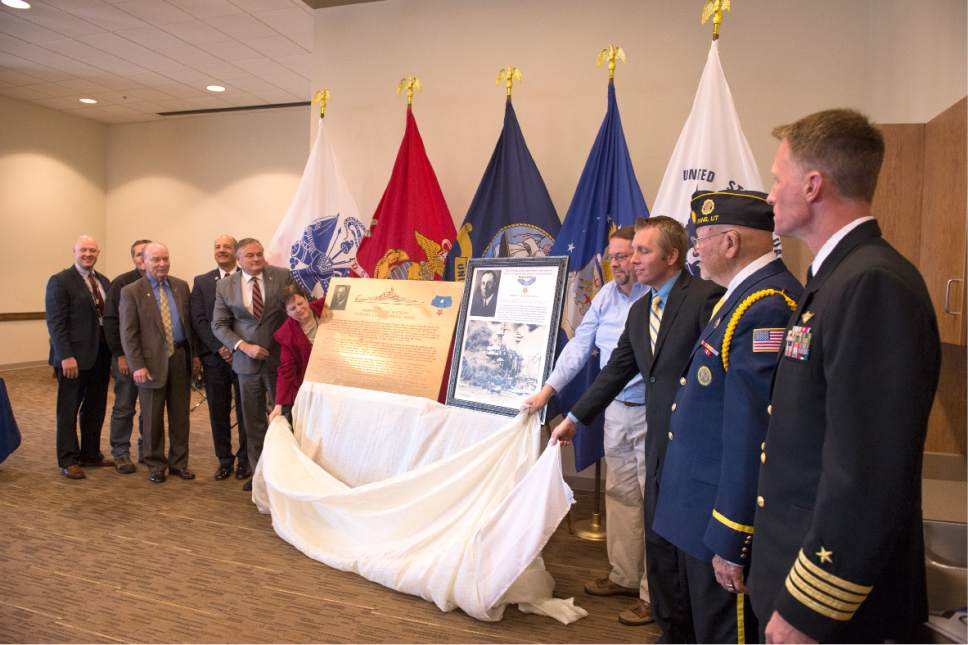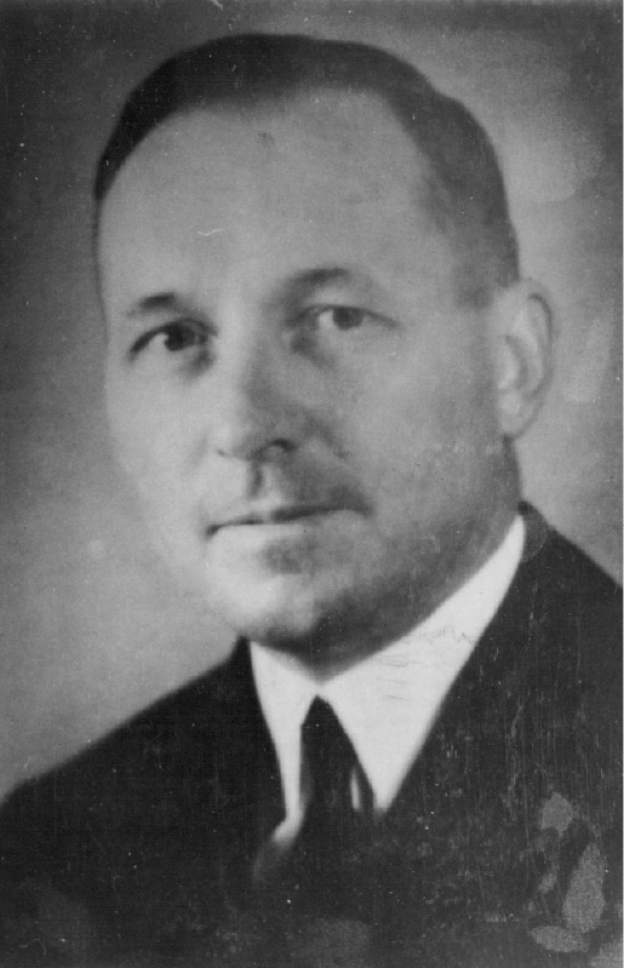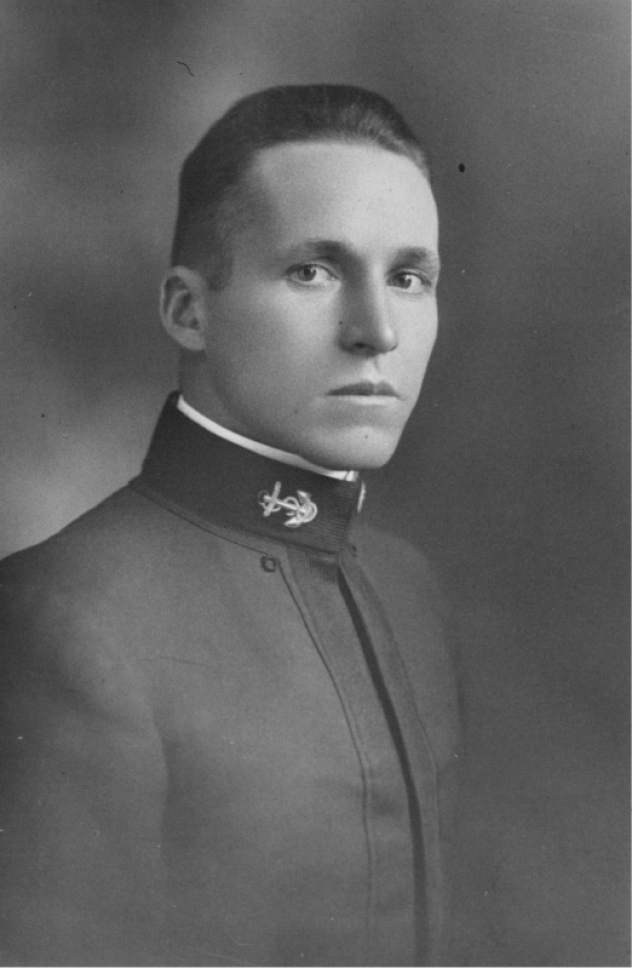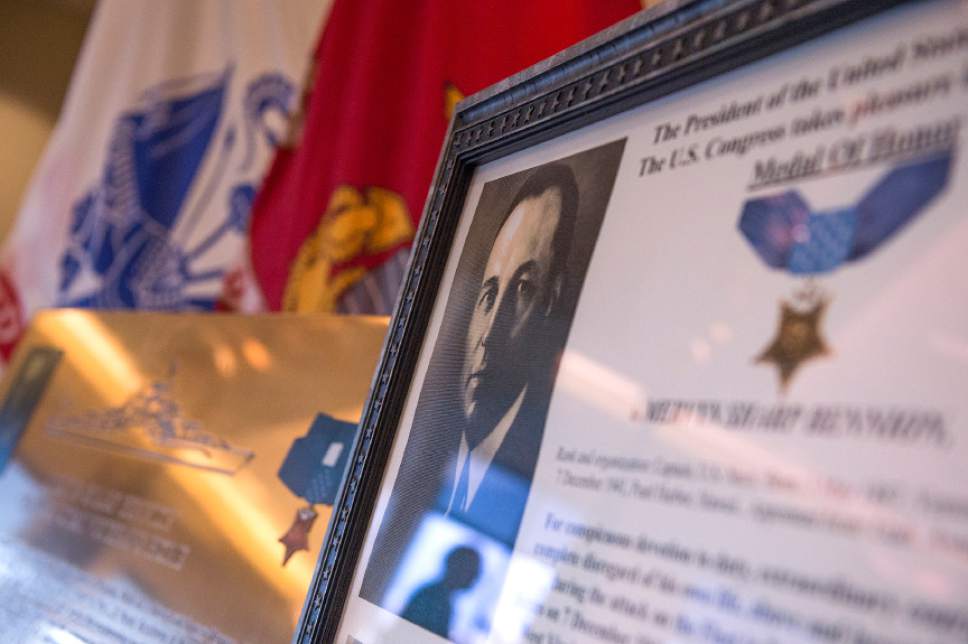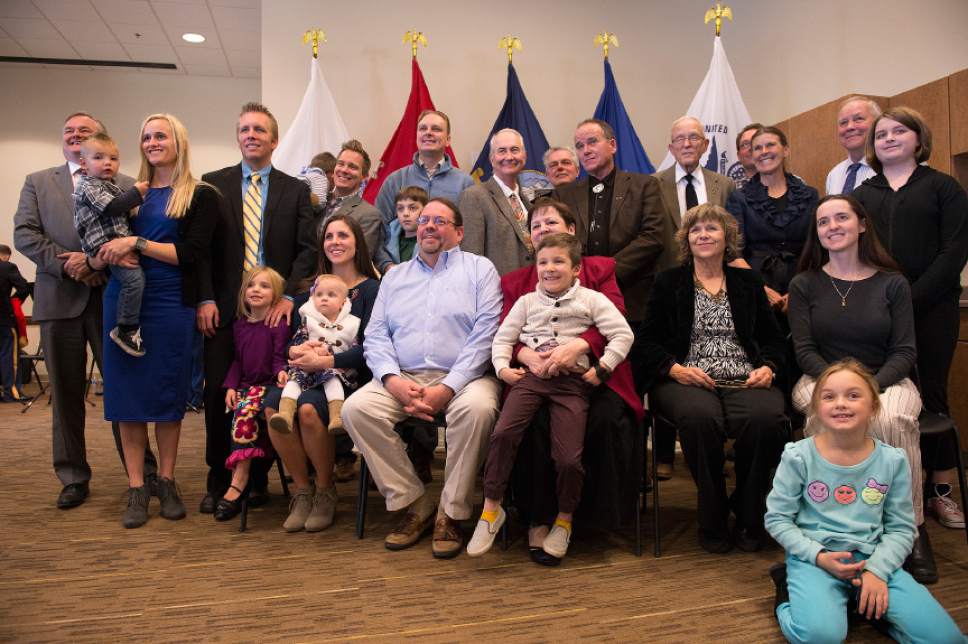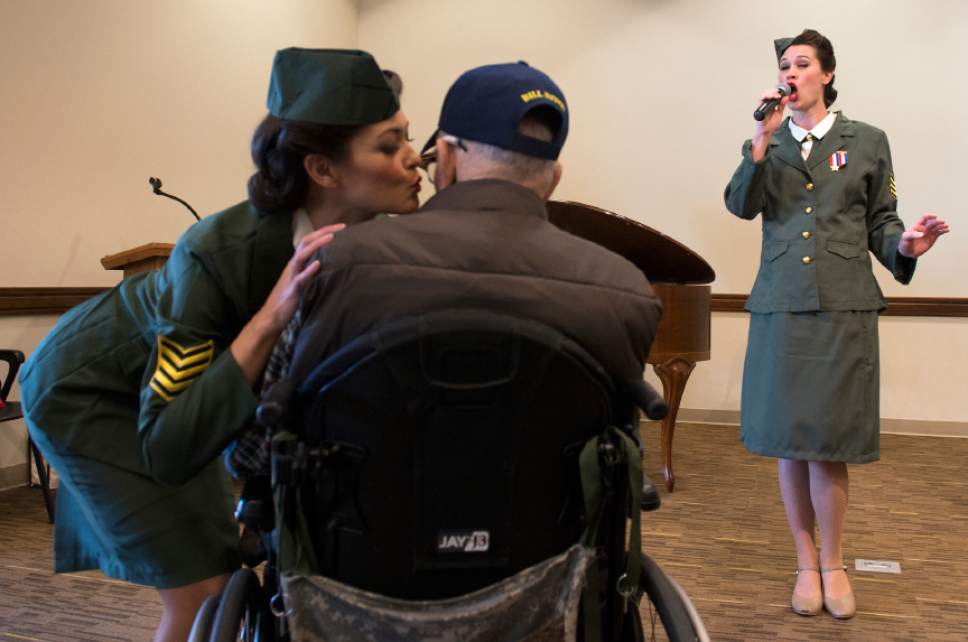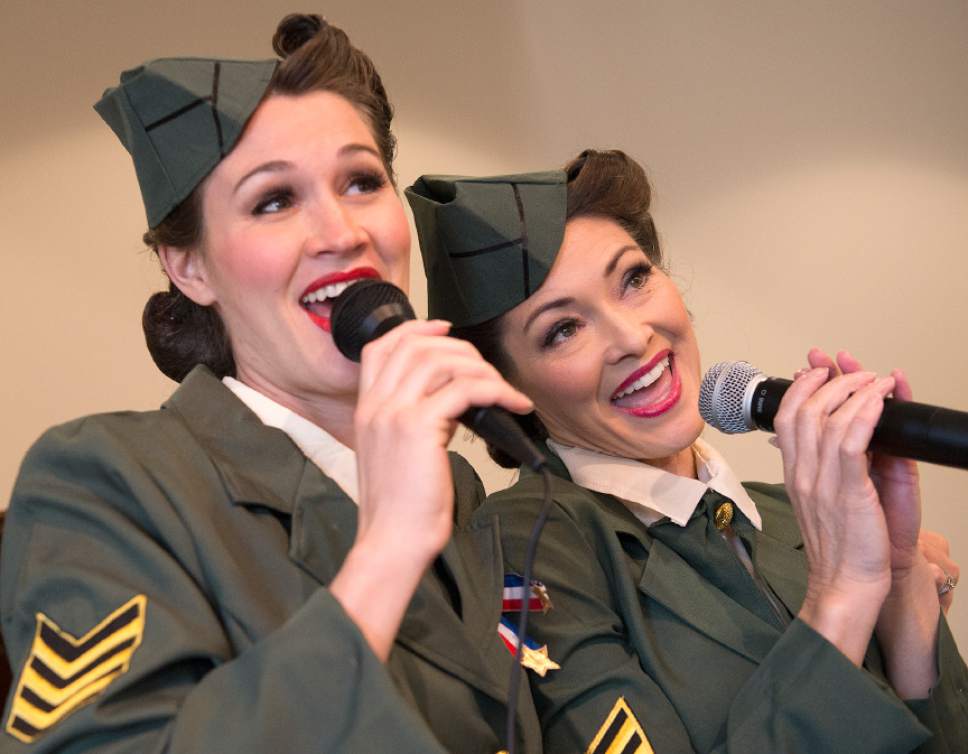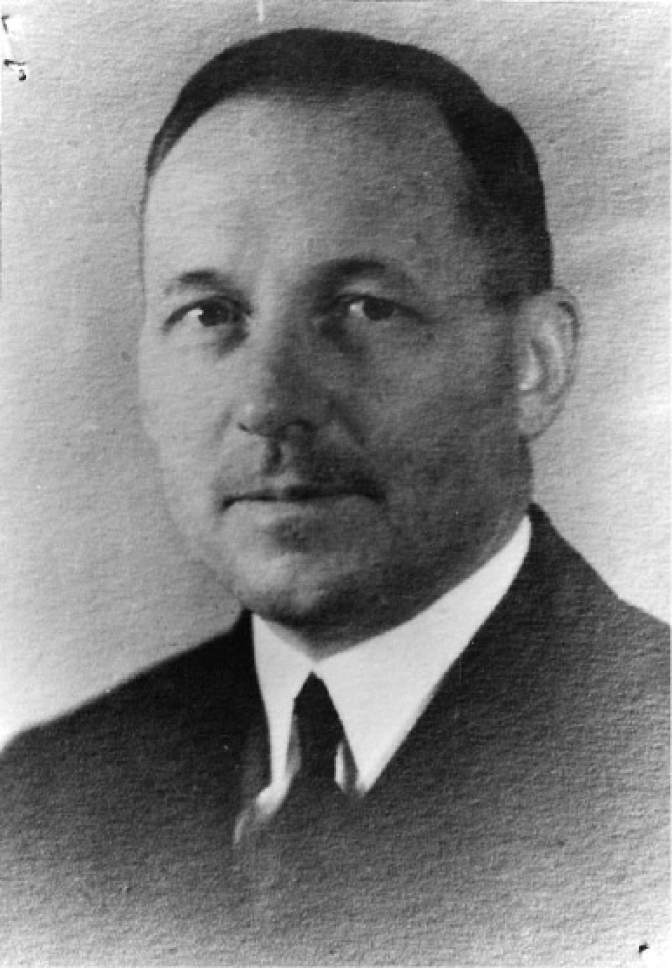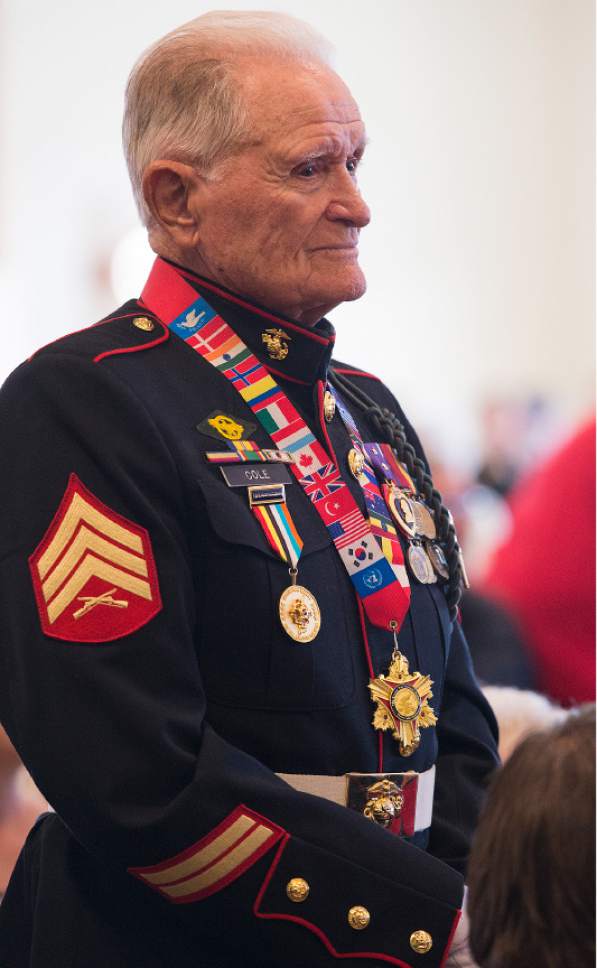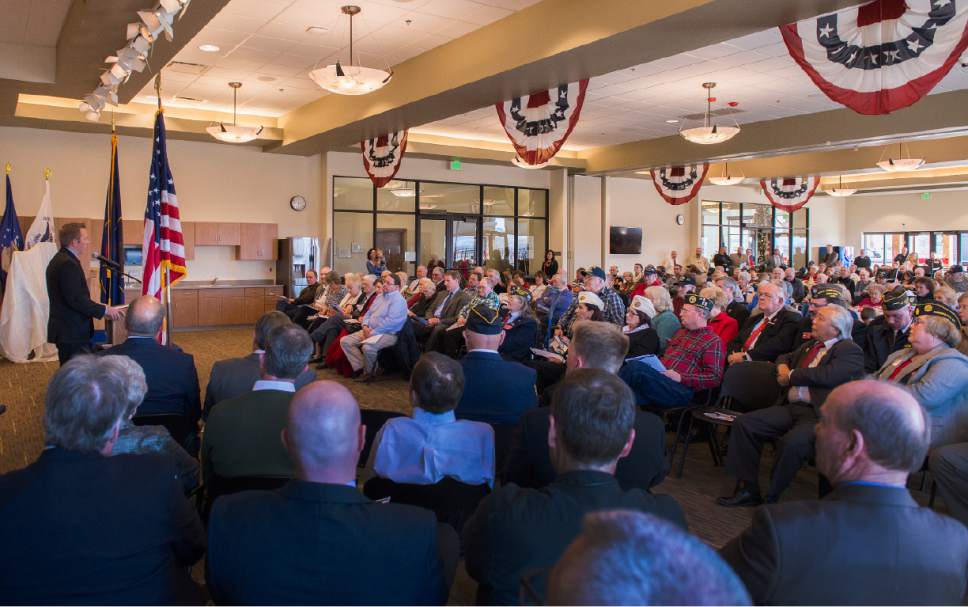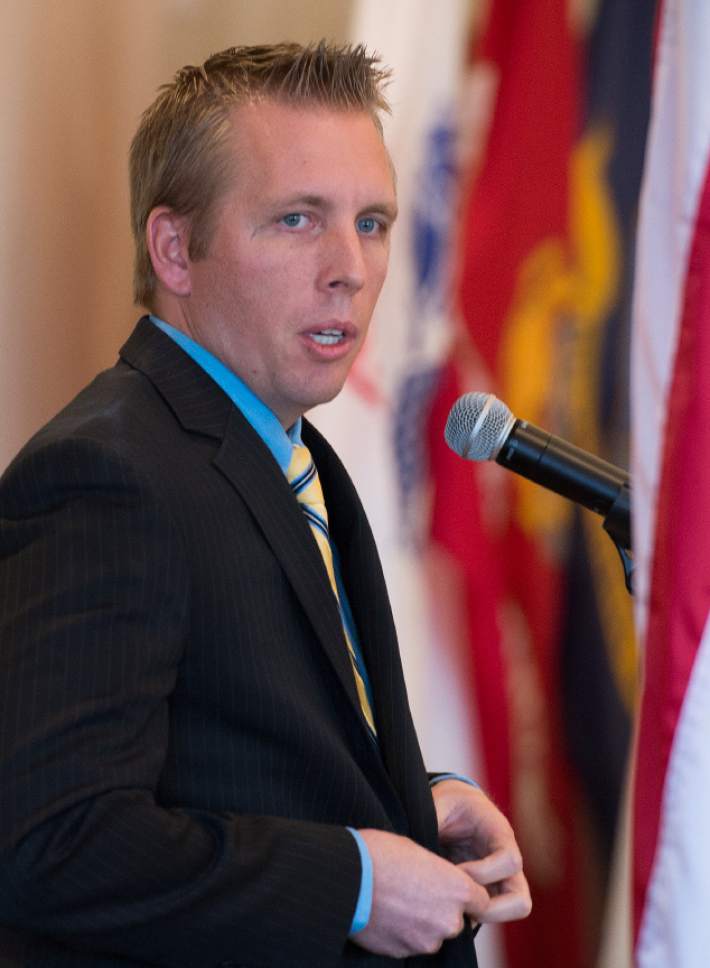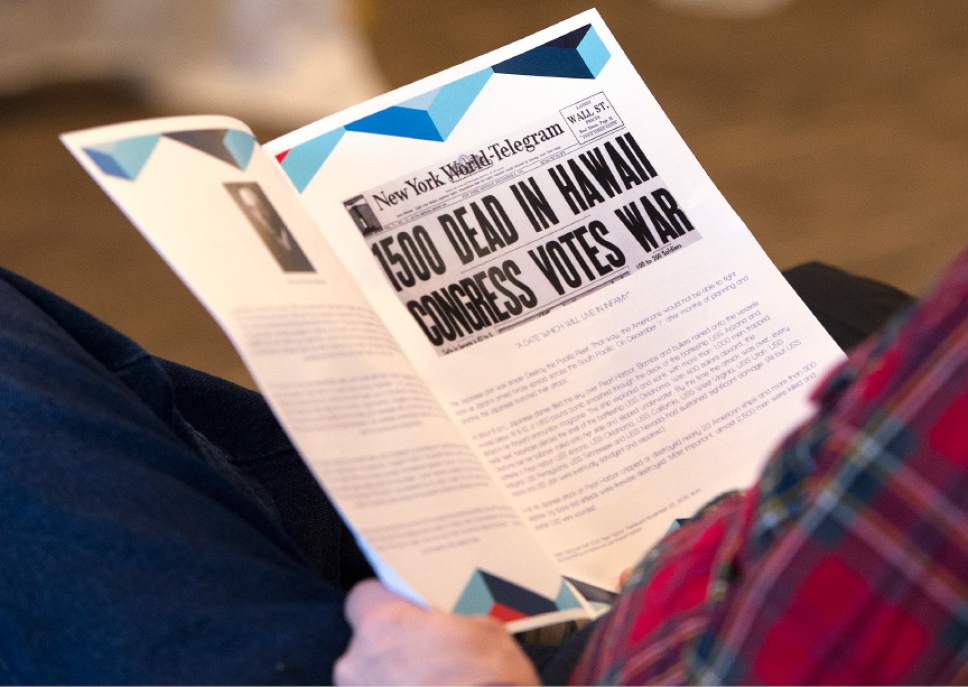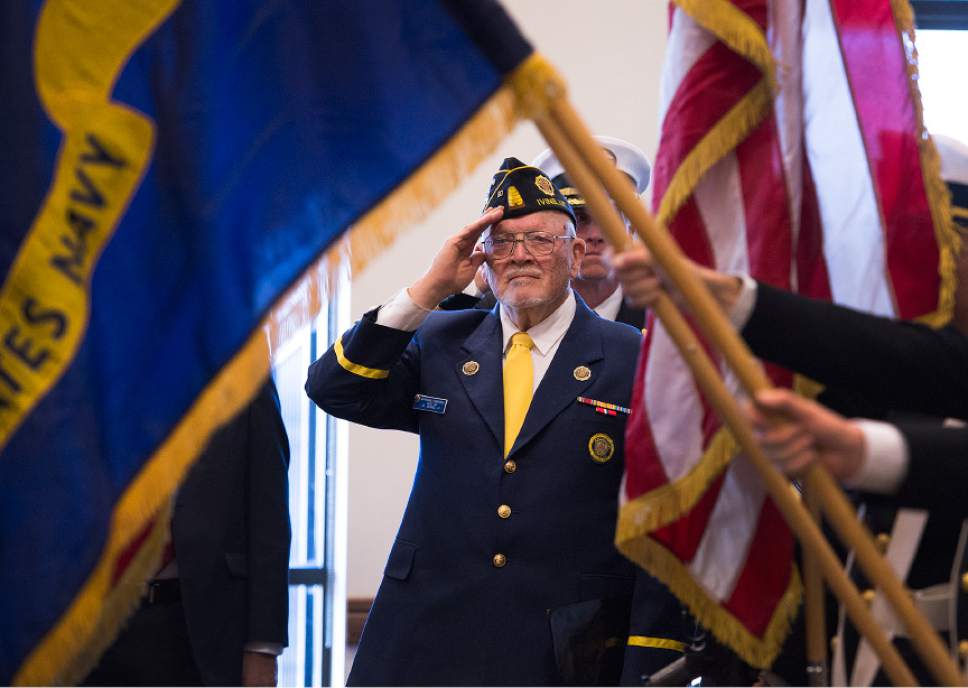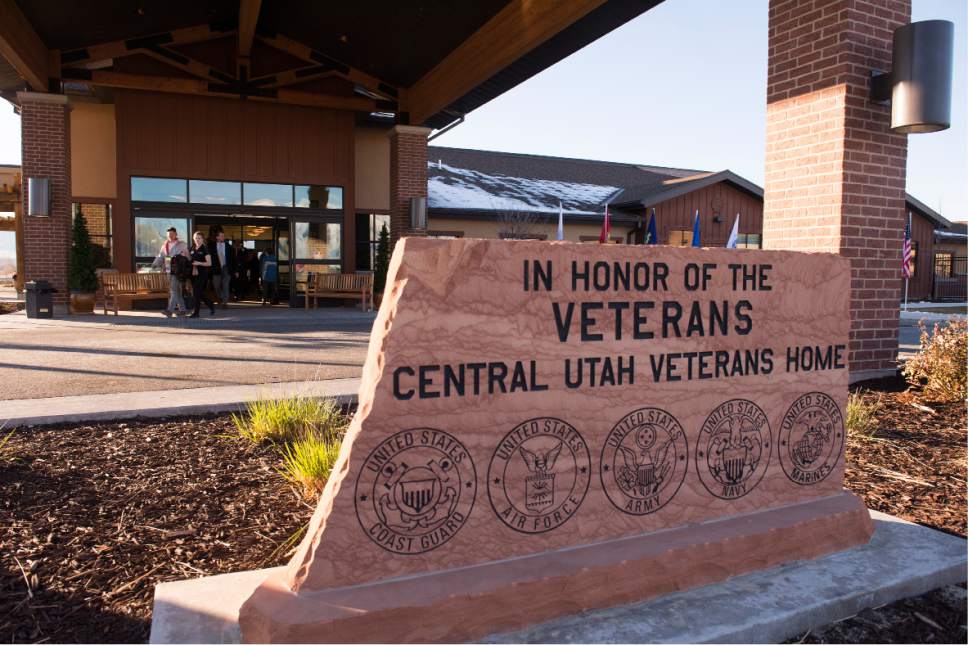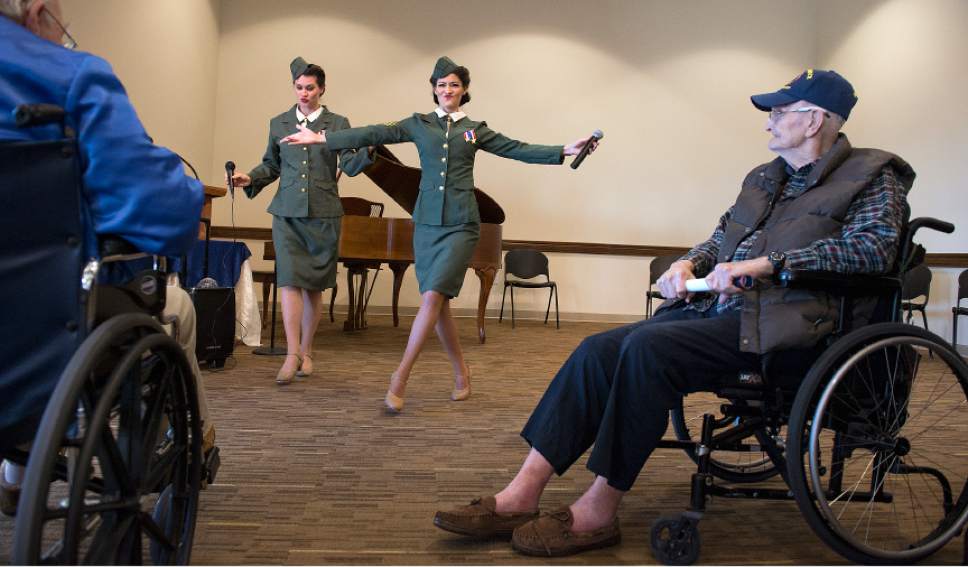Leah Hogsten | The Salt Lake Tribune
The Payson Veterans Home is being named for World War II Medal of Honor Recipient ñ Mervyn
| Tribune File Photo
Capt. Mervyn Bennion
| Tribune File Photo
Capt. Mervyn Bennion.
Leah Hogsten | The Salt Lake Tribune
In commemoration of the 75th anniversary of the Japanese attack on Pearl Harbor December 7,
Leah Hogsten | The Salt Lake Tribune
Capt. Mervyn Sharp Bennion's descendants pose for a photo in the Central Utah Veterans Home
Leah Hogsten | The Salt Lake Tribune
The Benson Sisters perform after the renaming ceremony, singing Glen Miller hits from the 1
Leah Hogsten | The Salt Lake Tribune
l-r The Benson Sisters, Julie Surjopolos and Lisa Benson perform after the renaming ceremon
Leah Hogsten | The Salt Lake Tribune
Utah's own Capt. Mervyn Sharp Bennion. Bennion, a U.S. Naval Academy graduate from Vernon,
Leah Hogsten | The Salt Lake Tribune
The Payson Veterans Home is being named for World War II Medal of Honor Recipient – Mervy
Leah Hogsten | The Salt Lake Tribune
Capt. Mervyn Sharp Bennion's gr-great grandson Mervyn S. Bennion IV talks about the bravery
Leah Hogsten | The Salt Lake Tribune
Capt. Mervyn Sharp Bennion's gr-great grandson Mervyn S. Bennion IV talks about the bravery
Leah Hogsten | The Salt Lake Tribune
The ceremony program included a newspaper headline from the New York World-Telegram publish
Leah Hogsten | The Salt Lake Tribune
Maynard Sorensen, center, was instrumental in the renaming of the Central Utah Veterans Hom
Leah Hogsten | The Salt Lake Tribune
In commemoration of the 75th anniversary of the Japanese attack on Pearl Harbor December 7
Leah Hogsten | The Salt Lake Tribune
l-r The Benson Sisters, Julie Surjopolos and Lisa Benson perform after the renaming ceremon
Leah Hogsten | The Salt Lake Tribune
The Payson Veterans Home is being named for World War II Medal of Honor Recipient ñ Mervyn S. Bennion. Bennion was awarded the Medal of Honor for his actions during the attack on Pearl Harbor, as commanding officer of the USS West Virginia, which ultimately cost him his life.
Wednesday, December 7, 2016
| Tribune File Photo
Capt. Mervyn Bennion
| Tribune File Photo
Capt. Mervyn Bennion.
Leah Hogsten | The Salt Lake Tribune
In commemoration of the 75th anniversary of the Japanese attack on Pearl Harbor December 7, 1941, the Central Utah Veterans Home in Payson renamed its facility after Utah's own Capt. Mervyn Sharp Bennion. Bennion, a U.S. Naval Academy graduate from Vernon, was in command of the USS West Virginia battleship on the morning of Dec. 7, 1941, as Japanese airplanes attacked the U.S. fleet in Hawaii. Bennion was awarded the Medal of Honor for his actions during that day, which ultimately cost him his life.
Leah Hogsten | The Salt Lake Tribune
Capt. Mervyn Sharp Bennion's descendants pose for a photo in the Central Utah Veterans Home. In commemoration of the 75th anniversary of the Japanese attack on Pearl Harbor December 7, 1941, the Central Utah Veterans Home in Payson renamed its facility after Utah's own Capt. Mervyn Sharp Bennion. Bennion, a U.S. Naval Academy graduate from Vernon, was in command of the USS West Virginia battleship on the morning of Dec. 7, 1941, as Japanese airplanes attacked the U.S. fleet in Hawaii. Bennion was awarded the Medal of Honor for his actions during that day, which ultimately cost him his life.
Leah Hogsten | The Salt Lake Tribune
The Benson Sisters perform after the renaming ceremony, singing Glen Miller hits from the 1940's. Lisa Benson (left) leans in to kiss Central Utah Veterans Home resident Bill Ritch as Julie Surjopolos sings, at right. In commemoration of the 75th anniversary of the Japanese attack on Pearl Harbor December 7, 1941, the Central Utah Veterans Home in Payson renamed its facility after Utah's own Capt. Mervyn Sharp Bennion. Bennion, a U.S. Naval Academy graduate from Vernon, was in command of the USS West Virginia battleship on the morning of Dec. 7, 1941, as Japanese airplanes attacked the U.S. fleet in Hawaii. Bennion was awarded the Medal of Honor for his actions during that day, which ultimately cost him his life.
Leah Hogsten | The Salt Lake Tribune
l-r The Benson Sisters, Julie Surjopolos and Lisa Benson perform after the renaming ceremony, singing Glen Miller hits from the 1940's after the ceremony. In commemoration of the 75th anniversary of the Japanese attack on Pearl Harbor December 7, 1941, the Central Utah Veterans Home in Payson renamed its facility after Utah's own Capt. Mervyn Sharp Bennion. Bennion, a U.S. Naval Academy graduate from Vernon, was in command of the USS West Virginia battleship on the morning of Dec. 7, 1941, as Japanese airplanes attacked the U.S. fleet in Hawaii. Bennion was awarded the Medal of Honor for his actions during that day, which ultimately cost him his life.
Leah Hogsten | The Salt Lake Tribune
Utah's own Capt. Mervyn Sharp Bennion. Bennion, a U.S. Naval Academy graduate from Vernon, was in command of the USS West Virginia battleship on the morning of Dec. 7, 1941, as Japanese airplanes attacked the U.S. fleet in Hawaii. Bennion was awarded the Medal of Honor for his actions during that day, which ultimately cost him his life.
Leah Hogsten | The Salt Lake Tribune
The Payson Veterans Home is being named for World War II Medal of Honor Recipient – Mervyn S. Bennion. Bennion was awarded the Medal of Honor for his actions during the attack on Pearl Harbor, as commanding officer of the USS West Virginia, which ultimately cost him his life.
Wednesday, December 7, 2016
Leah Hogsten | The Salt Lake Tribune
Capt. Mervyn Sharp Bennion's gr-great grandson Mervyn S. Bennion IV talks about the bravery of his gr-great grandfather. In commemoration of the 75th anniversary of the Japanese attack on Pearl Harbor December 7, 1941, the Central Utah Veterans Home in Payson renamed its facility after Utah's own Capt. Mervyn Sharp Bennion. Bennion, a U.S. Naval Academy graduate from Vernon, was in command of the USS West Virginia battleship on the morning of Dec. 7, 1941, as Japanese airplanes attacked the U.S. fleet in Hawaii. Bennion was awarded the Medal of Honor for his actions during that day, which ultimately cost him his life.
Leah Hogsten | The Salt Lake Tribune
Capt. Mervyn Sharp Bennion's gr-great grandson Mervyn S. Bennion IV talks about the bravery of his gr-great grandfather. In commemoration of the 75th anniversary of the Japanese attack on Pearl Harbor December 7, 1941, the Central Utah Veterans Home in Payson renamed its facility after Utah's own Capt. Mervyn Sharp Bennion. Bennion, a U.S. Naval Academy graduate from Vernon, was in command of the USS West Virginia battleship on the morning of Dec. 7, 1941, as Japanese airplanes attacked the U.S. fleet in Hawaii. Bennion was awarded the Medal of Honor for his actions during that day, which ultimately cost him his life.
Leah Hogsten | The Salt Lake Tribune
The ceremony program included a newspaper headline from the New York World-Telegram published on December 8, 1941. The Payson Veterans Home is being named for World War II Medal of Honor Recipient – Mervyn S. Bennion. Bennion was awarded the Medal of Honor for his actions during the attack on Pearl Harbor, as commanding officer of the USS West Virginia, which ultimately cost him his life.
Wednesday, December 7, 2016
Leah Hogsten | The Salt Lake Tribune
Maynard Sorensen, center, was instrumental in the renaming of the Central Utah Veterans Home in honor of Capt. Mervyn Sharp Bennion. In commemoration of the 75th anniversary of the Japanese attack on Pearl Harbor December 7, 1941, the Central Utah Veterans Home in Payson renamed its facility after Utah's own Capt. Mervyn Sharp Bennion. Bennion, a U.S. Naval Academy graduate from Vernon, was in command of the USS West Virginia battleship on the morning of Dec. 7, 1941, as Japanese airplanes attacked the U.S. fleet in Hawaii. Bennion was awarded the Medal of Honor for his actions during that day, which ultimately cost him his life.
Leah Hogsten | The Salt Lake Tribune
In commemoration of the 75th anniversary of the Japanese attack on Pearl Harbor December 7, 1941, the Central Utah Veterans Home in Payson renamed its facility after Utah's own Capt. Mervyn Sharp Bennion. Bennion, a U.S. Naval Academy graduate from Vernon, was in command of the USS West Virginia battleship on the morning of Dec. 7, 1941, as Japanese airplanes attacked the U.S. fleet in Hawaii. Bennion was awarded the Medal of Honor for his actions during that day, which ultimately cost him his life.
Leah Hogsten | The Salt Lake Tribune
l-r The Benson Sisters, Julie Surjopolos and Lisa Benson perform after the renaming ceremony, singing Glen Miller hits from the 1940's after the ceremony as Central Utah Veterans Home resident Bill Ritch, right, watches. In commemoration of the 75th anniversary of the Japanese attack on Pearl Harbor December 7, 1941, the Central Utah Veterans Home in Payson renamed its facility after Utah's own Capt. Mervyn Sharp Bennion. Bennion, a U.S. Naval Academy graduate from Vernon, was in command of the USS West Virginia battleship on the morning of Dec. 7, 1941, as Japanese airplanes attacked the U.S. fleet in Hawaii. Bennion was awarded the Medal of Honor for his actions during that day, which ultimately cost him his life.


